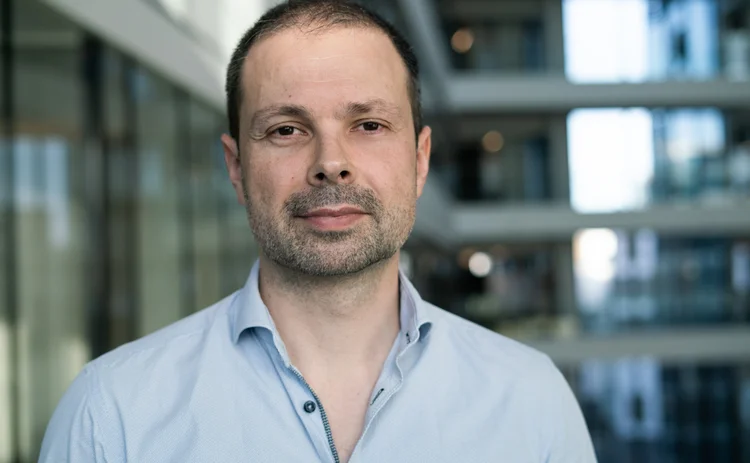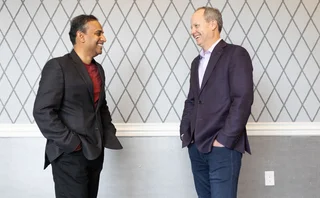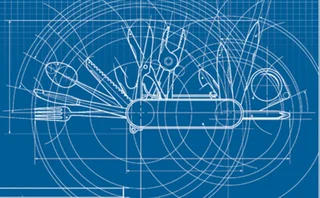The Problem Solver: Paul Bari, Nordea
Paul Bari’s career has taken him across oceans and continents, but his true north has always been a fascination with mathematics. Now, he’s tackling not only the future of one of Northern Europe’s largest banks, but its employees, too

What if your hero told you that you were going to fail? For Paul Bari, group chief information officer and head of technology at one of Europe’s largest banks, it was a very real scenario. He recalls sitting in a lecture hall at the University of Queensland, Australia in 1996, having just started a bachelor’s degree in applied science in information technology. His professor was Terry Halpin, universally regarded as a giant in the field of relational databases and data modeling, and who had a way of making an entrance.
“‘Pretty much everyone in this class is going to fail,’” Bari recalls Halpin saying. “‘This is too difficult. I would suggest that you go and do programming.’”
It was a formative moment for Bari, who was in awe of Halpin’s academic research on conceptual modeling, and for his reputation as having learned his trade under Edgar F. Codd, the creator of relational databases. As he sat in an exam room, staring at a worksheet with a language he had never laid eyes on before, known as relational algebra, he resolved to prove him wrong. If he passed, he told himself, if Halpin’s theories weren’t correct this time, then he would pursue a career dedicated to data and databases.
That decision would set the template for his future, one that would eventually lead to his role running technology for Nordea, in its Copenhagen offices.
The Roadmap to Success
Bari says he has always had a personal interest in problem-solving—something that has been a constant throughout his career. At the age of seven, he remembers his father handing him a Commodore 64 computer to play with, something he describes as a novelty for kids in 1980s Australia. Growing up, this focus on problem-solving manifested itself as a preoccupation with math, resulting in him graduating from AB Paterson College, a private school, as one of the top-ranked students in Australia for math in 1995. He received automatic admission to his top college choice, the University of Queensland, where his affinity for equations, algebra, and mathematical solutions pushed him into the wider world of computer science, IT and data.
After graduating with a BA in applied science, with a major in computer science, he got his first job as a senior Oracle database administrator for Transport New South Wales. He remembers getting the role by “sheer luck” at the time and being assigned a project to help design an integrated transport database for the Sydney Olympics in 2000. The role involved learning about various forms of coding and geographical information systems, similar to a low-level version of Google Maps.
“I really enjoyed it because of the problem-solving part and I loved that it was tangible,” he says. “A lot of times in IT and what we do, you don’t get to see the tangible output and it can eat away at you in ways you don’t really realize over time, because you start getting further and further away from what really matters and the impact of things.”
A series of different roles followed. He remained at Transport New South Wales for over five years, then had a six-month stint as a consultant at a global gaming firm—a position he describes as being “morally uncomfortable”—and later worked as a treasury implementation consultant at Integrity Treasury Solutions, which was later acquired by SunGard. In 2005, he applied for a position at the Commonwealth Bank of Australia (CBA), as an IT developer.
Bari was impressed by the people he met at the bank during the interview process, and much like the day he took Terry Halpin’s class for the first time, he resolved that he would work for the bank.
The only trouble was, they didn’t want him—at least, initially.
“I had never been rejected from a job before, and they immediately rejected me,” he recalls. “I remember doing the interview questions, and I think I got two out of 13 correct, from my memory. So, I called the recruiter, and they said that [CBA was] not interested. But I said, ‘I want to work here.’”
After a not-insignificant amount of back-and-forth between the two, the bank agreed to hire him as an enterprise IT developer on the basis that he would accept a 40 percent pay cut. Bari agreed, kick-starting his career in banking. They threw him in at the deep end. Soon after joining the bank, he was assigned what he describes as an impossibly high-profile task, in developing an in-house customer relationship system named CommSee.
The platform was designed to be able to determine the risk profile of clients for the issuance of loans, such as home loans. Multiple variables and permeations were built into the system to map out and assess client relationships using large quantities of data. Bari was responsible for writing the code that would enable it to function in real time.
“So, for six months, I literally locked myself away in that bank,” he explains. “I would code overnight to fix a challenge the bank had—to find a way to find all the relationships customers had with one another in real time. This was the precursor to what is called a client relationship.”
After half a year, the function eventually resulted in as little as 20 lines of code for the algorithm. CommSee alone cost the bank around A$600 million to build, and in less than a year, in response to his hard work, Bari was awarded a pay rise—making back the 40 percent pay cut he forfeited when accepting the role. He describes working on the project as inspirational and that the opportunity enabled him to mix with some of the most intelligent people he had ever met.
For a man who had spent his whole life being special, from his early achievements in math through to the university class his professor told him that he wouldn’t pass—which he did, albeit, he admits, “barely”—it was yet another seminal experience in his personal and professional development.
“I went from being a big fish in a small pond to being a very small fish, and I learned so much,” he says.
Hygiene First
After almost three years at CBA, Bari was headhunted to join Barclays Investment Bank in Singapore as a regional head of database and global Oracle service manager. Here he learned the nuts and bolts of investment banking, and more importantly, operational hygiene.
“The key to me being here today is you have got to be able to deliver and you have got to do it the right way. And you always have to focus on [operational] hygiene first,” he says.
Operational hygiene applies to a firm’s entire set of processes to ensure stability, security, risk management, compliance, and effective governance. The hygiene philosophy also focuses on a firm’s technology capabilities in maintaining clean, high-quality data throughout the data lifecycle, including storing, processing, managing and monitoring of data—across servers, platforms, hardware, software, networks, and devices. Hygiene also seeks to minimize overall operational and maintenance costs pertaining to IT and retain the necessary data essential to the firm.
During this time, Bari learned a great deal about the importance of investing in people, infrastructure and effective communications across global teams for a bank that operates 24 hours a day, seven days a week. Each morning, his boss would call him for an update on the events that happened hours before in New York. This led him to quickly implementing early warning systems, efficient handovers and performing effective due diligence.
After 19 months at Barclays, Bari was headhunted for a second time to join Standard Chartered Bank as a global head of database in Singapore. He was pitched the prospect of having the freedom of being hands-on across operations and development. To this day, he recalls the period as his “teenage years” with regards to management and the level of maturity he had managing teams. He describes the experience as the best management school he ever attended due to the variety of challenges and complexities he encountered across operations, politics, and geographies. Although he reflects on the experience as a positive one, he says he felt as if his career in finance had reached a nadir, prompting a need for change.
“It was the best management school I could have asked for but after living in Singapore for nine years, I said to myself I was done with banking,” Bari explains.
Changing Tides
As Bari toyed with the idea of leaving the industry for good and going back to Australia to spend his days micro-farming and body surfing on the Gold Coast, a close friend of his suggested that he should apply for the role of CTO at Nordea. Looking for a fresh start, he was drawn to the idea, with the intent of taking on the position for a short time, and testing out the Nordic region. He says that “doing the interviews and talking to the people [at Nordea] was enough”—enough for him to move across oceans and give investment banking another shot. Falling in love with Copenhagen and the cultural feel of the bank, he decided to stay long-term—he jokes that Danish food was also a key factor in his decision.
Eight months on, Bari was presented with the opportunity of becoming group CIO and head of technology, following his boss’s departure from the firm. Bari accepted the role and immediately set out to hone in on some of the banks biggest tech challenges. To date, a core focus has been automation and the need to remove human inefficiencies.
“I don’t find comfort in watching a machine going around and around perfectly without any interaction from myself. When the job is done, move on. So, I want to innovate, I want to automate, I want to push the needle forward,” he says.
Bari explains that he has set out an ambitious automation agenda for 2019 to tackle these challenges head-on. Over the next 12 months, the bank will heavily focus on only hiring full stack automation engineers to help create a more seamless IT infrastructure.
“You can train them in whatever specialty you want but that’s the minimum requirement,” he explains to his team. “Those are the people I want to hire in 2019. There will be some exceptions, but as a general rule, because I want us to get away from how everything is ‘human reliant’ into a fully digitized world.”
He has also attempted to broaden the type of person that enters the banking industry. Last year he launched a program with a Danish firm called Special Listeners with the objective of hiring an entire automation team of people with autism.
“I asked [the firm], ‘have you ever worked with a bank before?’ They said no. I said, ‘I want to be the first bank,’” he recalls.
Since launching the program, Nordea has spent six months recruiting a team of developers and engineers. In that time, the project has provided an environment for individuals to access specialized support while also helping the bank to reduce bottom-line costs.
As a broader vision for his department, Bari aims to separate the conversation between jobs and roles in creating an agile workforce, capable of adjusting to technology advancements and constantly adopting new skillsets.
Although automation and tech advancements are expected to remove the reliance on humans for certain processes, Bari says that teams should become flexible in their ability to take on different roles within a firm. He believes in changing the cultural mindset embedded within a bank’s psyche and diversifying his team’s abilities. As one example of this, he established a program named Coding for Everyone, where his entire department was taught to code, including his secretary. As other banks such JP Morgan have also announced similar projects, Bari believes that coding will soon become as common as literacy, and a prevalent skillset.
Targeting the bank’s technology infrastructure, Bari explains that it’s important to keep things simple and create standard building blocks. His vision is to create a “developers’ paradise” where the data and technology operate flexibly across the cloud and local datacenters, in a secured way. This objective is to provide his team with a seamless work environment for developing technologies more efficiently.
Outside the architectural concerns, part of his remit has also been investigating use-cases for emerging technology. Some of these efforts have already borne fruit—the first area into which the bank deployed artificial intelligence capabilities was assessing disability claims. Bari explains that this investment is indicative of Nordea’s cultural perspective to assist with real problems rather than just focusing on profitable areas.
Using the technology, the entire claim and approval process, which normally takes seven weeks, can be completed on the same day. In his time at Nordea, Bari has helped to promote ethical conversations and encourage critical thought around technology investments, to establish long-term confidence within the bank.
“We understand now that banking is only sustainable if the consumer benefits, because if they don’t, we will eventually fail as an organization,” says Bari.
Reflecting on his journey until this point, Bari explains that there is no secret to his approach other than hard work and a burning desire to constantly improve, make an impact and push boundaries. He says that too often in the world of technology people fall victim to the idea something can’t be done. Looking back over his career he has shown a consistent track record tackling problems head-on, no matter how complex.
“To copy a catchphrase, a lot of times we talk about what can’t be done or what inhibits us. I just say to people, ‘let’s just do it,’” he says. “Let’s work on the basis that it can be done, and we are the smart people who will find the way of making it happen.”
Only users who have a paid subscription or are part of a corporate subscription are able to print or copy content.
To access these options, along with all other subscription benefits, please contact info@waterstechnology.com or view our subscription options here: http://subscriptions.waterstechnology.com/subscribe
You are currently unable to print this content. Please contact info@waterstechnology.com to find out more.
You are currently unable to copy this content. Please contact info@waterstechnology.com to find out more.
Copyright Infopro Digital Limited. All rights reserved.
You may share this content using our article tools. Printing this content is for the sole use of the Authorised User (named subscriber), as outlined in our terms and conditions - https://www.infopro-insight.com/terms-conditions/insight-subscriptions/
If you would like to purchase additional rights please email info@waterstechnology.com
Copyright Infopro Digital Limited. All rights reserved.
You may share this content using our article tools. Copying this content is for the sole use of the Authorised User (named subscriber), as outlined in our terms and conditions - https://www.infopro-insight.com/terms-conditions/insight-subscriptions/
If you would like to purchase additional rights please email info@waterstechnology.com
More on Emerging Technologies
Ice moves to meet demand for greater cloud, AI capabilities
The exchange also outlined competitive advantages behind managing its data and cloud strategy internally during its Q1 earnings call on Thursday.
FactSet looks to build on portfolio commentary with AI
Its new solution will allow users to write attribution summaries more quickly and adds to its goal of further accelerating discoverability, automation, and innovation.
How Ally found the key to GenAI at the bottom of a teacup
Risk-and-tech chemistry—plus Microsoft’s flexibility—has seen the US lender leap from experiments to execution.
The IMD Wrap: Beginning of the end for data audits?
This week, there’s exciting news for data bean-counters in the form of a partnership between two vendors that could change the way we view and track data usage and audits.
S&P debuts Spark Assist genAI copilot, draws up ‘Blueprints’ of combined datasets
S&P’s Kensho subsidiary has rolled out new emerging tech products leveraging AI to explore and combine the vendor’s wealth of datasets to solve common use cases.
Nasdaq reshuffles tech divisions post-Adenza
Adenza is now fully integrated into the exchange operator’s ecosystem, bringing opportunities for new business and a fresh perspective on how fintech fits into its strategy.
Liquidnet sees electronic future for gray bond trading
TP Icap’s gray market bond trading unit has more than doubled transactions in the first quarter of 2024.
Most read
- Chris Edmonds takes the reins at ICE Fixed Income and Data Services
- DTCC urges affirmation focus ahead of T+1 move
- FactSet looks to build on portfolio commentary with AI








